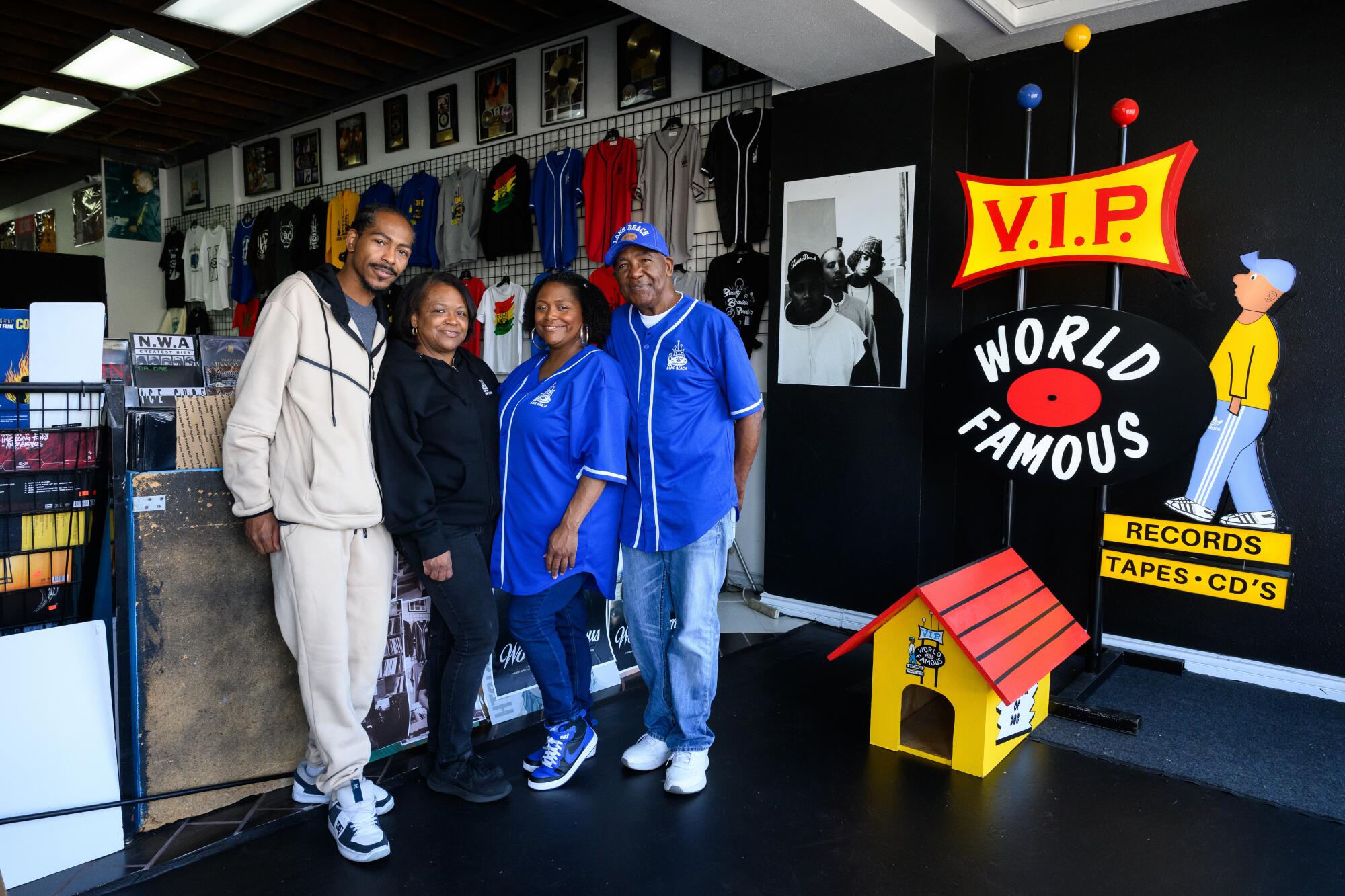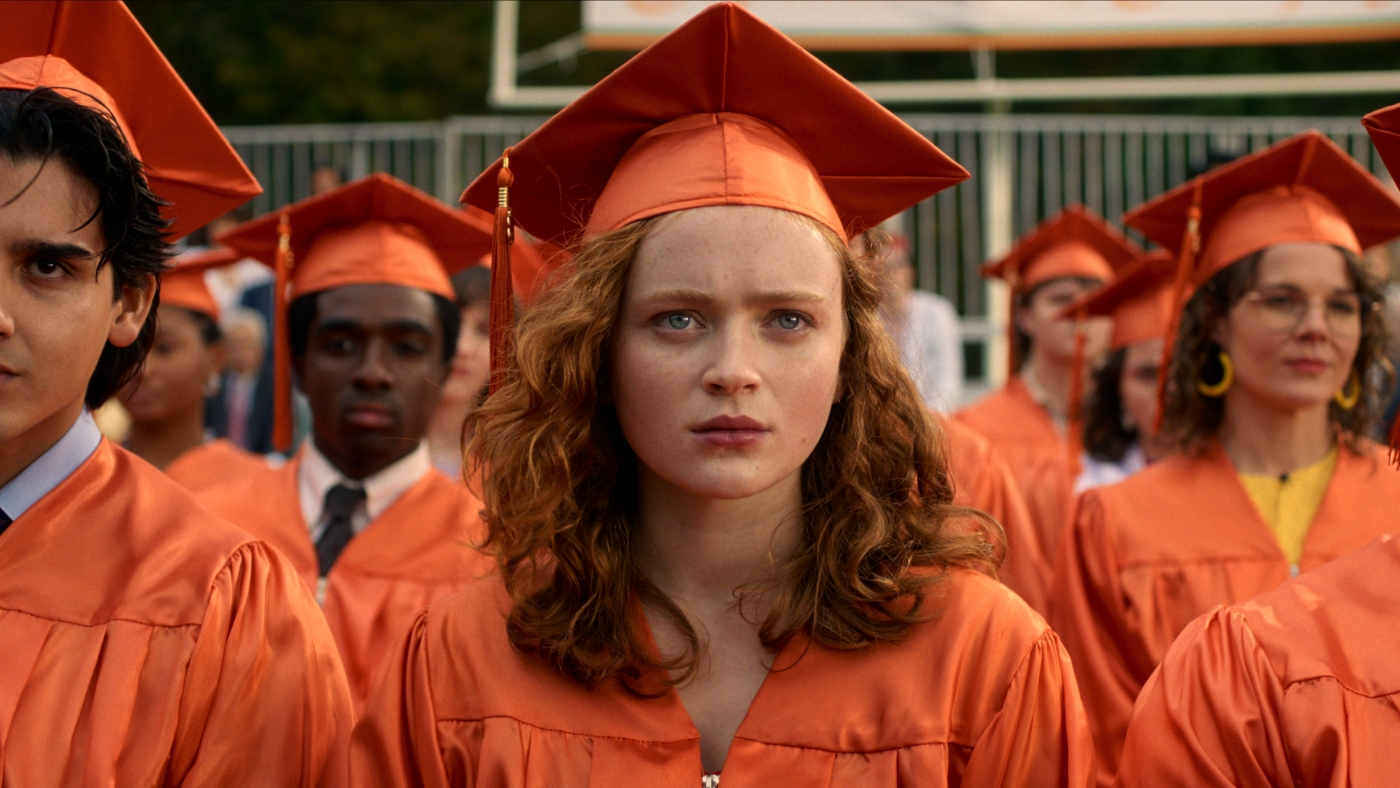Lifestyle
VIP Records helped launch Snoop Dogg’s career. Now the shop owner wants to build a museum

In the early 1990s, Kelvin Anderson Sr. built a makeshift recording studio in the back of his Long Beach record store, a vinyl-filled paradise called the World Famous VIP Records on the corner of Pacific Coast Highway and Martin Luther King Jr. Avenue. He wanted to give youth a creative outlet in the gang ridden neighborhood.
Word quickly spread around the city, and aspiring artists started sprinkling in. Folks like Snoop Dogg, Warren G and Nate Dogg — who were part of a trio dubbed 213, the Long Beach area code at the time — famously cut their first demo there.
The late Christopher George Latore Wallace, better known by his stage name The Notorious B.I.G., is pictured with fellow artist Craig Mack and VIP Records owner Kelvin Anderson in front of the store.
(Courtesy of VIP Records)
”Trust me, there were many kids in there,” says Anderson, who’s now 70 and known as “Pops” in the community. “Some were learning how to sing, dance, to be a producer and, in Ricky Harris’ case, how to be a comedian. There was a lot going on. Jamie Foxx used to hang out there. DJ Quik learned how to produce music there. It was a place to come and explore the possibility of being an entertainer.”
These are among the decades of stories that stem from the family-owned record store that has been a mecca for G-funk music and has helped boost the careers of some of rap’s biggest stars. Today, Anderson, who’s worked in the music industry for more than 50 years, is hoping to preserve the history of VIP Records by converting it into a museum and educational center.
“This brand is so loved and recognized around the world, so we need this museum,” Anderson said during a Tuesday unveiling event, co-hosted by the nonprofit Creative Class Collective. “The story needs to be told and the importance of Black music in general, and the role that it has played.”

Ashanti Dykes plays the guitar at VIP Records.
(William Liang / For The Times)
Anderson adds, “When it comes to rap and hip-hop, VIP Records was the first to sell rap music on the West Coast, period.”
Anderson’s older brother, Cletus, opened the first VIP Records in 1967, and his siblings helped open 13 more locations throughout L.A. County. Anderson, who is one of 10 children, followed his family’s tradition of moving from their Mississippi hometown to L.A. after he graduated high school, to help run the stores. In 1978, Cletus opened the World Famous VIP Records in Long Beach, and Anderson took it over a few months later. (Cletus died in 2024 at age 82.)
In 2017, the city of Long Beach made VIP Records’ iconic sign a historic landmark. Mayor Rex Richardson says that the city also put forth a “significant amount of money” to refurbish the sign and that he hopes to place it onto public property near the store so visitors can visit and experience it. He says he wants to turn it “into an actual monetary opportunity” to support Anderson’s vision for the museum. He and the Anderson family are in the process of working out an agreement.

Members of the Anderson family. There were once 14 VIP Records locations throughout L.A. County but today, only the Long Beach store remains.
(William Liang / For The Times)
“A museum, in order to do it right, it will need some sustainable resources, so let’s take this rich cultural capital we have and begin to put it on display,” says Richardson, adding that the restoration project is part of a larger plan known as Elevate 28 to beautify and highlight historic landmarks in Long Beach in time for the 2028 Summer Olympics, which Los Angeles is hosting. He also wants to open a legends walk to showcase famous Long Beach natives.
-
Share via
Due to the ever-evolving music industry that has shifted to streaming, the Anderson family closed all but its Long Beach store, which is a few steps away from its original location. Historical artifacts fill the walls of the record store, including plaques and awards from various record labels and photos of artists like Rick James, the Jacksons and Donna Summer who visited the shop. Near the front of the store is a replica of the shop’s landmark sign that Snoop Dogg famously featured in his music video for “Who Am I (What’s My Name)?” from his 1993 debut album, “Doggystyle.” Next to a counter, there’s a framed image taken by longtime photographer, Duke Givens, of his childhood friend, Snoop Dogg, on display.
“The reason why [VIP Records] has staying power is because of love,” says Givens, a Long Beach native who grew up frequenting the store and described it as a third space for locals. “It’s an institution. It’s more than just a location. You know how we have church, we have school, we have sports … we have VIP.”

Photographer Duke Givens poses for a portrait with an image he took in 1994.
(William Liang / For The Times)
The idea to open a museum came to Anderson several years ago when a father walked into the store with his two sons. As they thumbed through the vinyl records, one of the preteens said, “Dad, what’s that?” Anderson recalls.
“There were a lot of people at the store that day, and everyone seemed to be tuned in,” Anderson says. “It was funny. I said, ‘Man, we need to tell the story. We need to tell the story of the record business.’”
During Tuesday’s event, Snoop Dogg called in and shared his support for the museum, marking a full-circle moment.
“I just want to thank you for giving us an opportunity to actually showcase our talent back when rap wasn’t so popular and it wasn’t so easy to do,” he said to Anderson. “All of y’all up there at the VIP gave us hope. Y’all gave us opportunity to actually make our dream come true and give us a platform to hear our voice for the first time on a cassette, to hear what we sounded like, to see what we meant to people.”
Travis A. Scott, a Long Beach native and rapper who goes by H.O.B.O (an acronym for Heart of a Brave One), went to VIP Records for the first time several years ago after hearing that Anderson was allowing artists to record music in the studio. He recorded his debut album, “City by tha Sea,” there and was signed under At Last VIP Entertainment, VIP Records’ label.
“VIP Records is a safe haven,” he says. “It protected me. It protected my mind from venturing fully into the gang violence and into the drug trade and all the other things that were negative in my community. This where I was able to come to be able to take my negative frustration out in a creative and productive way. That allowed me to free myself from the burdens of others calamities, to be able to be myself instead of what the community and the environment wanted me to be.”

The record store, which remains a place to find modern and classic albums, often hosts events for the community.
(William Liang / For The Times)
Anderson says he envisions great-grandparents bringing their great-grandkids to the space to learn about the evolution of the music industry and most importantly, VIP Records’ impact on it.
“We need that support,” says Anderson, adding that people can make donations via their foundation website. “We need everybody to get behind this movement. It would be something that people would enjoy throughout the rest of their life.”
As Tenisha Anderson, chief operating officer for VIP Records, flipped through photos of her father, Kelvin, in his early days at the store, she said that it’s a “no-brainer” for VIP Records to have a museum.
“There are so many things that are actually dying off, and I don’t want to be political, but they are even taking books away,” says Tenisha, who is also the founder of the VIP Family Foundation and runs several young adult programs including Beauty, Brains and Beats, a workshop that highlights the music industry from a female perspective. “The thing is, you can’t take the music away. The music is always going to tell the story. The music is always going to build you up emotionally. The music is always going to be empowering because it comes from the soul.”

Lifestyle
Sunday Puzzle: New newsmakers of 2025

On-air challenge
Every year around this time I present a “new names in the news” quiz. I’m going to give you some names that you’d probably never heard before 2025 but that were prominent in the news during the past 12 months. You tell me who or what they are.
1. Zohran Mamdani
2. Karoline Leavitt
3. Mark Carney
4. Robert Francis Prevost (hint: Chicago)
5. Jeffrey Goldberg (hint: The Atlantic)
6. Sanae Takaichi
7. Nameless raccoon, Hanover County, Virginia
Last week’s challenge
Last week’s challenge came from Joseph Young, of St. Cloud, Minn. Think of a two-syllable word in four letters. Add two letters in front and one letter behind to make a one-syllable word in seven letters. What words are these?
Challenge answer
Ague –> Plagued / Plagues / Leagues
Winner
Calvin Siemer of Henderson, Nev.
This week’s challenge
This week’s challenge is a numerical one from Ed Pegg Jr., who runs the website mathpuzzle.com. Take the nine digits — 1, 2, 3, 4, 5, 6, 7, 8, 9. You can group some of them and add arithmetic operations to get 2011 like this: 1 + 23 ÷ 4 x 5 x 67 – 8 + 9. If you do these operations in order from left to right, you get 2011. Well, 2011 was 15 years ago. Can you group some of the digits and add arithmetic symbols in a different way to make 2026? The digits from 1 to 9 need to stay in that order. I know of two different solutions, but you need to find only one of them.
If you know the answer to the challenge, submit it below by Thursday, January 8 at 3 p.m. ET. Listeners whose answers are selected win a chance to play the on-air puzzle.
Lifestyle
Daniel Tosh Sells Lake Tahoe Estate for $10.75 Million

Daniel Tosh
Sells Lake Tahoe Home for Millions
Published
Daniel Tosh has officially sold his sprawling Lake Tahoe compound but the comedian isn’t leaving the area … TMZ has learned.
Real estate sources tell us the 7-bedroom, 7-bath estate officially closed Friday for $10.75 million, and Tosh bought another property across the lake to be closer to friends, which is why he decided to sell.
The gated estate, located on the pristine west shore between Tahoe City and Sunnyside, sprawls across 1.6 acres and features three distinct homes, each with its own character and charm.
The Upper House is the ultimate entertainer’s dream … 4 bedrooms, 3 baths, elevator, game room, industrial ice cream maker, 4-car garage, hot tub, fire pit, bocce and horseshoe pits, and sprawling lawns with breathtaking lake views.
The Middle House keeps classic Tahoe charm alive with knotty pine interiors, 3 bedrooms, 3 baths, a stone fireplace, skylit kitchen, and steam shower — perfect for unwinding after a day on the lake.
The lakeside cabin is a serene retreat with a studio loft, retro kitchenette, modern bathroom, and French doors opening right onto the lake.
Altogether, the property boasts 93 feet of lake frontage, two buoys, and multiple outdoor spaces for fun and relaxation.
Daniel may be moving, but one thing’s clear … he’s still very much a Lake Tahoe guy, just on the other side of the lake now.
Lifestyle
What worked — and what didn’t — in the ‘Stranger Things’ finale

Sadie Sink as Max Mayfield.
Netflix
hide caption
toggle caption
Netflix
Yes, there are spoilers ahead for the final episode of Stranger Things.
On New Year’s Eve, the very popular Netflix show Stranger Things came to an end after five seasons and almost 10 years. With actors who started as tweens now in their 20s, it was probably inevitable that the tale of a bunch of kids who fought monsters would wind down. In the two-plus-hour finale, there was a lot of preparation, then there was a final battle, and then there was a roughly 40-minute epilogue catching up with our heroes 18 months later. And how well did it all work? Let’s talk about it.
Worked: The final battle
The strongest part of the finale was the battle itself, set in the Abyss, in which the crew battled Vecna, who was inside the Mind Flayer, which is, roughly speaking, a giant spider. This meant that inside, Eleven could go one-on-one with Vecna (also known as Henry, or One, or Mr. Whatsit) while outside, her friends used their flamethrowers and guns and flares and slingshots and whatnot to take down the Mind Flayer. (You could tell that Nancy was going to be the badass of the fight as soon as you saw not only her big gun, but also her hair, which strongly evoked Ripley in the Alien movies.) And of course, Joyce took off Vecna’s head with an axe while everybody remembered all the people Vecna has killed who they cared about. Pretty good fight!
Did not work: Too much talking before the fight
As the group prepared to fight Vecna, we watched one scene where the music swelled as Hopper poured out his feelings to Eleven about how she deserved to live and shouldn’t sacrifice herself. Roughly 15 minutes later, the music swelled for a very similarly blocked and shot scene in which Eleven poured out her feelings to Hopper about why she wanted to sacrifice herself. Generally, two monologues are less interesting than a conversation would be. Elsewhere, Jonathan and Steve had a talk that didn’t add much, and Will and Mike had a talk that didn’t add much (after Will’s coming-out scene in the previous episode), both while preparing to fight a giant monster. It’s not that there’s a right or wrong length for a finale like this, but telling us things we already know tends to slow down the action for no reason. Not every dynamic needed a button on it.
Worked: Dungeons & Dragons bringing the group together
It was perhaps inevitable that we would end with a game of D&D, just as we began. But now, these kids are feeling the distance between who they are now and who they were when they used to play together. The fact that they still enjoy each other’s company so much, even when there are no world-shattering stakes, is what makes them seem the most at peace, more than a celebratory graduation. And passing the game off to Holly and her friends, including the now-included Derek, was a very nice touch.

Charlie Heaton as Jonathan Byers, Natalia Dyer as Nancy Wheeler, Maya Hawke as Robin Buckley, and Joe Keery as Steve Harrington.
Netflix
hide caption
toggle caption
Netflix
Did not work: Dr. Kay, played by Linda Hamilton
It seemed very exciting that Stranger Things was going to have Linda Hamilton, actual ’80s action icon, on hand this season playing Dr. Kay, the evil military scientist who wanted to capture and kill Eleven at any cost. But she got very little to do, and the resolution to her story was baffling. After the final battle, after the Upside Down is destroyed, she believes Eleven to be dead. But … then what happened? She let them all call taxis home, including Hopper, who killed a whole bunch of soldiers? Including all the kids who now know all about her and everything she did? All the kids who ventured into the Abyss are going to be left alone? Perfect logic is certainly not anybody’s expectation, but when you end a sequence with your entire group of heroes at the mercy of a band of violent goons, it would be nice to say something about how they ended up not at the mercy of said goons.


Worked: Needle drops
Listen, it’s not easy to get one Prince song for your show, let alone two: “Purple Rain” and “When Doves Cry.” When the Duffer Brothers say they needed something epic, and these songs feel epic, they are not wrong. There continues to be a heft to the Purple Rain album that helps to lend some heft to a story like this, particularly given the period setting. “Landslide” was a little cheesy as the lead-in to the epilogue, but … the epilogue was honestly pretty cheesy, so perhaps that’s appropriate.
Did not work: The non-ending
As to whether Eleven really died or is really just backpacking in a foreign country where no one can find her, the Duffer Brothers, who created the show, have been very clear that the ending is left up to you. You can think she’s dead, or you can think she’s alive; they have intentionally not given the answer. It’s possible to write ambiguous endings that work really well, but this one felt like a cop-out, an attempt to have it both ways. There’s also a real danger in expanding characters’ supernatural powers to the point where they can make anything seem like anything, so maybe much of what you saw never happened. After all, if you don’t know that did happen, how much else might not have happened?
This piece also appears in NPR’s Pop Culture Happy Hour newsletter. Sign up for the newsletter so you don’t miss the next one, plus get weekly recommendations about what’s making us happy.
Listen to Pop Culture Happy Hour on Apple Podcasts and Spotify.
-

 Entertainment1 week ago
Entertainment1 week agoHow the Grinch went from a Yuletide bit player to a Christmas A-lister
-

 World7 days ago
World7 days agoHamas builds new terror regime in Gaza, recruiting teens amid problematic election
-

 Indianapolis, IN1 week ago
Indianapolis, IN1 week agoIndianapolis Colts playoffs: Updated elimination scenario, AFC standings, playoff picture for Week 17
-

 Southeast1 week ago
Southeast1 week agoTwo attorneys vanish during Florida fishing trip as ‘heartbroken’ wife pleads for help finding them
-

 Business1 week ago
Business1 week agoGoogle is at last letting users swap out embarrassing Gmail addresses without losing their data
-

 World1 week ago
World1 week agoBest of 2025: Top five defining moments in the European Parliament
-

 World1 week ago
World1 week agoSnoop Dogg, Lainey Wilson, Huntr/x and Andrea Bocelli Deliver Christmas-Themed Halftime Show for Netflix’s NFL Lions-Vikings Telecast
-

 News1 week ago
News1 week agoDOJ says it may need a ‘few more weeks’ to finish releasing Epstein files




















